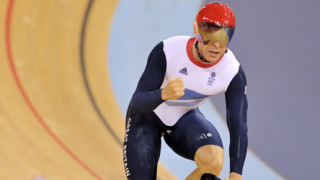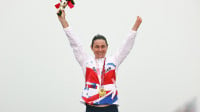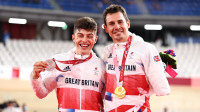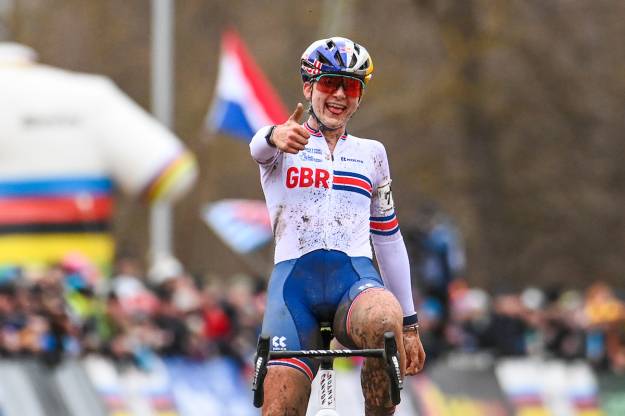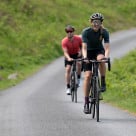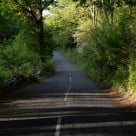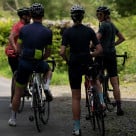To put Chris Hoy's achievement in London's velodrome into context, you have to go back almost 13 years to the World Championships in Berlin.
October 1999. There are almost eleven months until the Olympic Games in Sydney. The Great Britain trio of Hoy, Craig MacLean and Jason Queally reached the final of the team sprint – except it wasn't called the team sprint then, it was still called the 'Olympic sprint'. A name change came later to avoid confusion. You couldn't have an Olympic sprint champion and an Olympic Olympic sprint champion.
Anyway, these three riders who represented the City of Edinburgh club had begun to upset the order of things in what was then a relatively new discipline. It had been introduced to the World Championship programme only four years earlier. The French and the Germans ruled sprinting on the track but a couple of Scotsmen and a former water polo player were beginning to push them hard.
Hoy, MacLean and Queally had dragged themselves into contention with talent and determination, now a combination of Lottery funding, more comprehensive coaching and greater experience racing against the best teams in the world was about to reap dividends.
In Berlin, the British team qualified as the fourth fastest, then raised their game in the knock-out round to beat Georgia. The shock was that they had recorded the second fastest time of the round and so they advanced to the final, where they faced the French.
Laurent Gané, Florian Rousseau and Arnaud Tournant made formidable opponents and although the British team were pretty well beaten, they had done enough to suggest that a medal at the Olympics might not be out of the question.
There was less suggestion that Hoy, the youngest member of the team at 23, would go on to win five Olympic golds in a glittering career that has brought him team and individual success. But Hoy has remained at the cutting edge of team sprinting ever since. It has required a remarkable desire to improve to remain part of an ever-evolving team that has changed around him while he has remained the constant. It is worth pointing out that the quickest time in that competition at the 1999 World Championships (44.683 seconds by the French) would not even have earned qualification for the knock-out round in Thursday's Olympic Games event.
When it came to the Olympics in Sydney, the French won the gold medal, beating Britain in the final. Had it not been for Jason Queally's incredible victory in the kilometre time trial, the team sprint result would still have been considered a major success.
The battle to topple France took another couple of years. They were silver medallists at the World Championships in Manchester in 2000 and took bronze a year later in Antwerp. Then, in Copenhagen in 2002, with the former BMX rider Jamie Staff now established in the line-up, they won the world title.
It was all looking good to clinch gold in Athens but in an event that is decided by the tiniest margins, a poor ride in the qualifying round cost them dearly. Hoy, MacLean and Staff could manage only seventh place, which put them up against Germany in the first round. With the winners advancing and the losers going out, the destiny of the British team was on a knife-edge.
The Germans won and went on to take the gold medal. The fact that Britain recorded the second fastest time of the entire competition did little to ease the disappointment. Hoy had, of course, already won the kilometre time trial but the way the team sprint panned out was a source of regret for them.
Another world title in Los Angeles in 2005 followed but the French had discovered Grégory Baugé and Mickael Bourgain who together with Arnaud Tournant were beginning to look unbeatable. They defeated Britain in three World Championships in a row – in Bordeaux, Palma and on home soil in Manchester just five months before the Beijing Olympics.
But after the slip-up in Athens, they got it right on the night in 2008. Hoy, Staff and the new boy Jason Kenny, who was just 20 years old, broke the world record and French spirits in qualifying. When they met in the gold medal final the French had no answer. Hoy went on to add the individual sprint and the Keirin.
The retirement of Jamie Staff was inevitable after Beijing and when he finally announced he was ending his career after the 2010 World Championships in Copenhagen, it became apparent just what sort of hole he was leaving in the squad. He had made the starter's position – man one – so firmly his own that it proved more problematic than anyone had initially thought.
The search for the magical formula led to British Cycling's coaches trying several riders and many more combinations. Ross Edgar and Matt Crampton won World Championship medals as part of the squad but there was a sense that the Germans and French had edged forward while the British were battling to stay on terms.
Identifying Philip Hindes and his sudden emergence as a world-class man one helped, of course, but in this event the result is determined by the sum of the team's parts not by one individual. And yet Hoy's position as the team's talisman, as its heartbeat, cannot be understated. He has been there for more than 13 years, from the days when they were three guys who found they were more than handy track sprinters but who travelled abroad more in hope than expectation to world record holders.
THE TEAM SPRINT ODYSSEY
Major milestones on the team sprint journey
1999 Berlin World Championships – silver medal (Hoy, MacLean, Queally) 45.485 in the final 2000 Sydney Olympic Games – silver medal (Hoy, MacLean, Queally) 44.517 in the semi-final
2002 Copenhagen World Championships – gold medal (Hoy, MacLean, Staff) 44.370 in the final
2005 Los Angeles World Championships – gold medal (Hoy, Staff, Queally) 44.337 in qualifying
2008 Beijing Olympic Games – gold medal (Hoy, Kenny, Staff) 42.950 in qualifying (world record)
2012 London Olympic Games – gold medal (Hoy, Kenny, Hindes) 42.600 in the final (world record)

